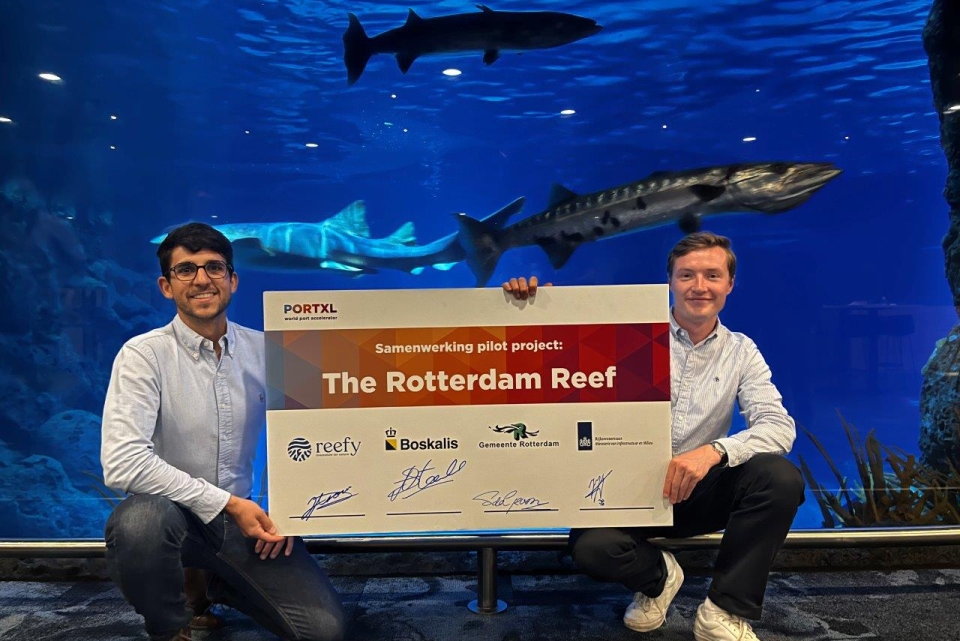In collaboration with the Municipality of Rotterdam, Rijkswaterstaat and Boskalis, the innovative start-up Reefy from Delft will test a modular artificial reef system. The system is to protect the riverbank against large ship waves and stimulates the development of nature.
Reefy is a young company from Delft, the Netherlands, that combines biology and hydraulic engineering to develop nature-inclusive solutions for water safety. It was founded by coastal engineering expert Jaime Ascencio and marine biologist Leon Haines.
Underwater Lego blocks
Reefy’s innovation consists of massive “Lego-like” blocks, which have been hydrodynamically designed and tested in the Deltares wave flume. By assembling these blocks underwater, a stable structure is formed that breaks waves, but also creates an underwater labyrinth where fish and other species can shelter and breed.
The blocks are made of sustainable concrete with a special texture on the surface. With this, the start-up aims to stimulate all kinds of biological growth such as oysters and mussels to create a living layer that promotes biodiversity and can grow with sea level rise, requiring less maintenance. Innovative materials to stimulate this are now being further tested behind the scenes in collaboration with Diergaarde Blijdorp.
The Groene Poort (Green Gate)
Since the end of 2013, the Municipality of Rotterdam, Rijkswaterstaat, the Port of Rotterdam and the World Wildlife Fund have been working together on sustainable, nature friendly riverbanks in the Nieuwe Waterweg and the Scheur. They do this, among other things, with clean residual material from construction. The project is called “De Groene Poort” or “Green Gate”.
To keep these natural banks in place and to protect them against the waves of ships and current, breakwaters are needed to create a foreshore. Rijkswaterstaat and the Municipality of Rotterdam are looking for more sustainable solutions for this than the usual rock or stone dams. By testing these reef innovations in collaboration with Reefy, the Municipality of Rotterdam and Rijkswaterstaat hope to find a resilient and sustainable solution to restore the natural values in the tidal area of the Maas river.
Boskalis
As an international leader in dredging, offshore wind, and maritime services, Boskalis is always looking for sustainable alternatives to implement in projects all over the world. Boskalis’ Artificial Reefs Programme supports innovative start-ups in developing products to achieve large-scale positive impact.
For the test set-up, Boskalis will help install the project in the Nieuwe Waterweg with large equipment and expertise. This project is also Boskalis’ fourth artificial reef knowledge development project under the Artificial Reefs Programme, with previous placements in Monaco, Kenya and Panama.
Also read: Port of Rotterdam and Eneco to provide shore power for Boskalis’ ships
PortXL
In 2021, the Municipality of Rotterdam and Boskalis gave Reefy so-called “golden tickets” to participate in the maritime accelerator programme PortXL. In this programme, start-ups and scale-ups are connected to potential customers and network to test and market innovations.
The Rotterdam Reef project, that aims at the chain from production of blocks to monitoring of the reef, has arisen from initiatives from all parties to stimulate innovation.
Also read: Rapid changes in the North Sea require long-term roadmap
Rotterdam Zoo Blijdorp
Blijdorp Zoo helps innovative companies by creating space as a testing ground. In collaboration with Delft University of Technology, Blijdorp offers facilities and guidance for start-ups to develop new technologies.
Reefy has worked closely with the Oceanium in Blijdorp to develop their technology. Behind the scenes, the start-up grows coral on various sustainable concrete alternatives to develop the perfect material for reef restoration.
At the visitors’ side in the Science Aquarium, Reefy has placed a scale model of the reef that will also be installed in the Green Gate to educate visitors about the use of artificial reefs for wildlife restoration and importance of reefs for coastal protection.
Installation in October
The four parties signed a cooperation agreement on the 24th of June. The plan is to place the reef, the Rotterdam Reef, in October 2022. The technical stability and ecological development are then monitored to see effects on nature and functioning of the reef as wave barrier.
Picture: Reefy founders Jaime Ascencio (left) and Leon Haines with the signed deal for the Rotterdam Reef.
Also read: Van Oord places oyster reefs at Dutch offshore wind farm








